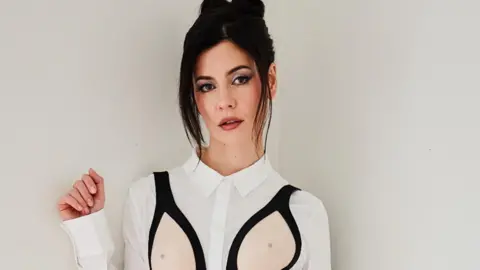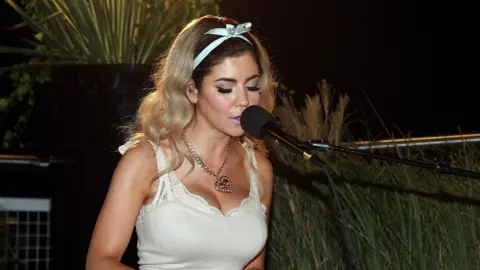 Courtesy of Crush Music
Courtesy of Crush MusicMarina Diamandis has released five albums – but she’s writing like she never has before, in a poetry book exploring, among other things, her experience of an eating disorder.
The singer, who was formerly known as Marina and the Diamonds, had never had an interest in poems.
But a couple of summers ago she found herself “writing lyrics that didn’t fit into songs” after taking psychedelics.
The result is Eat The World, a collection that has been described by Vanity Fair as “insightful and introspective” – and the 39-year-old says the book expands on a feeling of loneliness she’s had her whole life.
The poems tackle an assortment of topics including sour relationships, the pros and cons of living in LA, becoming comfortable with yourself as a woman in your 30s – they also describe how the singer dealt with having bulimia in her 20s.
 Getty Images
Getty Images “There are parallels to the themes in my music,” she adds.
“I think one of the main themes has been a sense of feeling isolated in some way in my life, or not feeling like I belonged.”
The first poem she shared on social media was called Aspartame – named after the artificial sweetener.
It tells the story of the singer moving to LA aged 20, trying to win the affection of a man, while being in the throes of an eating disorder.
Bulimia is an eating disorder and mental health condition where people binge on food and then make themselves vomit, take laxatives or exercise excessively – and while anyone can get it, the NHS says it’s more common in those aged 15 – 25.
It’s something she’s touched on in her music before, in 2012’s Electra Heart, on track Teen Idle, she alludes to being bulimic, with mentions of purging.
In Aspartame, the descriptions of the physical side effects of bulimia aren’t sugar coated, she is “rail thin in a polka dress” with “tooth enamel dissolved by stomach acid”. And in Smoothness of Money, she talks about a “binge-purge cycle”.
For Diamandis, she says she felt comfortable exploring the illness in her poetry as it is something she now feels far removed from – and that it is important to take away any shame from the condition.
‘I couldn’t sing’
“This chapter in my life was like 15 years ago, so I feel very much moved on, and I’m able to talk about it and not feel any kind of shame or self-consciousness,” she says.
“I think it’s really important to take that mystery or shame away from it.
“At the end of the day, it’s like any other mental illness or health issue, and it can be life-threatening, and most of all, for the majority of people, it makes your life a misery.
“I think with the subject of eating disorders, there’s so much secrecy around the illness itself, like in terms of maintaining it, or being allowed to exist doing what you’re doing without kind of commentary from other people, because it’s obviously such a harmful thing.”
It was the physical side effects of bulimia which Diamandis says encouraged her to get better, as her throat was so damaged she couldn’t sing.
“It was about five years in that I decided I’m not actually ever going to achieve my dream of being a singer and an artist if I continue with this,” she says.
“I actually quit this vocal course that I was doing at the time, when I was around 21 before I got signed, because my throat was so raw I couldn’t sing anymore.
“And I decided from then I was going to recover, and then I went through the thing of gaining weight and not feeling great about that, but it took a couple of years to even out.
“A couple of years later, I got signed and my life started to improve, and other things became more important than that.”
Diamandis says her recovery was “gradual”, and that it took about 10 years.
She also points out that there’s a misconception that eating disorders are “about wanting to be thin or looking a certain way”.
“It really is never that – that’s like the surface issue, but then below that there are family issues happening, there’s always self-esteem stuff going on.”
For those currently struggling, Diamandis says people shouldn’t be hard on themselves.
“[Don’t beat] yourself up for having it, because I remember feeling a lot of guilt about even having it.
“I think feeling more compassionate towards myself was maybe one of the first things that I would advise people, but also everyone that’s going to have their own journey.”
‘Shame and stigma’
It’s something the eating disorder charity Beat echoes, adding that they “urge anyone struggling to make an appointment with their GP as soon as possible, or if you’re worried about a loved one, encourage them to do so”.
“Eating disorders thrive on shame and stigma, so it’s really helpful when celebrities and public figures choose to speak openly about their experiences,” the charity says.
“This helps reinforce the message that eating disorders can affect anyone and that there’s nothing to be ashamed of.
“Bulimia is a serious mental illness but it’s completely possible to make a full recovery – every day we hear from people who’ve gone on to live full lives, free of their eating disorder.”
Diamandis has been working in the industry since 2008, when being a size zero was still a toxic ideal – however, she just thinks society has switched one set of body standards for another.
“On one hand, we now celebrate things like being super curvy or having a tiny waist or a big bum, and that’s great because it’s not size zero,” she says.
“But I just feel like we’ve swapped one set of ideals for another, and the prevalence of like surgery and doing things to your face just feels like at an all-time high.
“And whilst women should always have the option to do whatever the hell they want, I kind of worry that it’s just another thing for women to worry about.”
For now, Diamandis is finishing work on album number six, but she can definitely see herself releasing more books.
“I can definitely see myself writing another poetry book, but maybe in three years’ time.
“I would love to write a book of essays at some point, but I don’t like to do two projects at once, so I would really want to do it properly – maybe after this next album, I’ll start writing another kind of book.”
If you’ve been affected by the issues raised in this article, help and support can be found on BBC Action Line.
